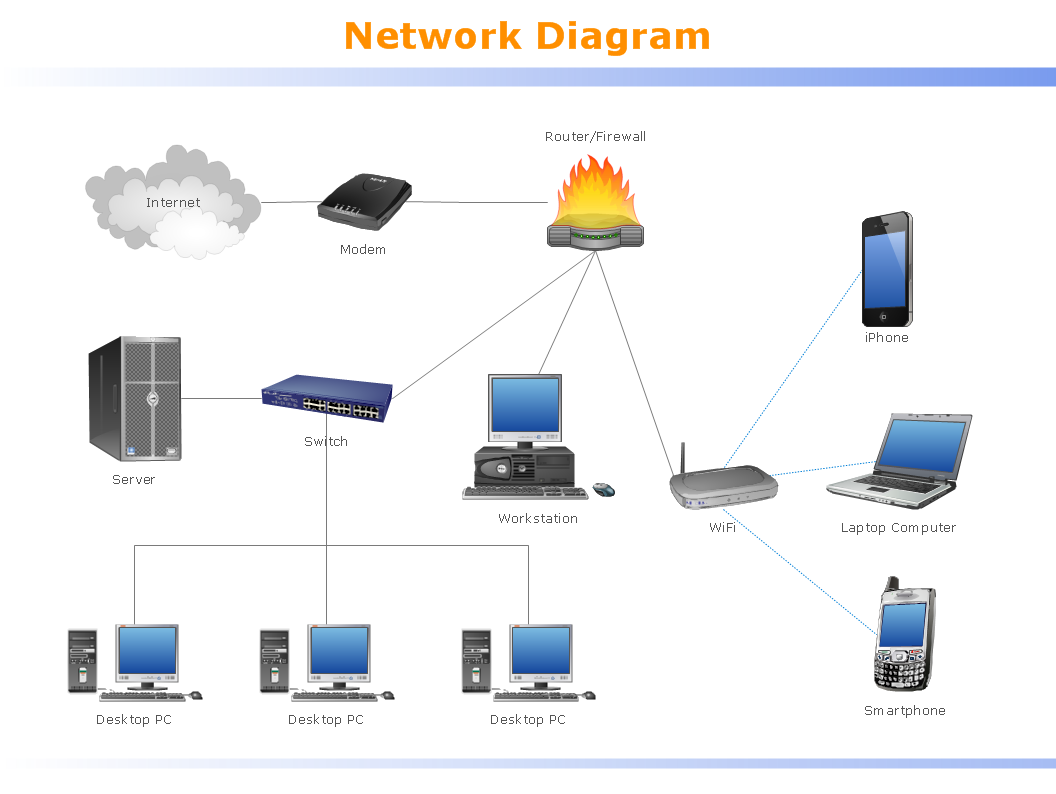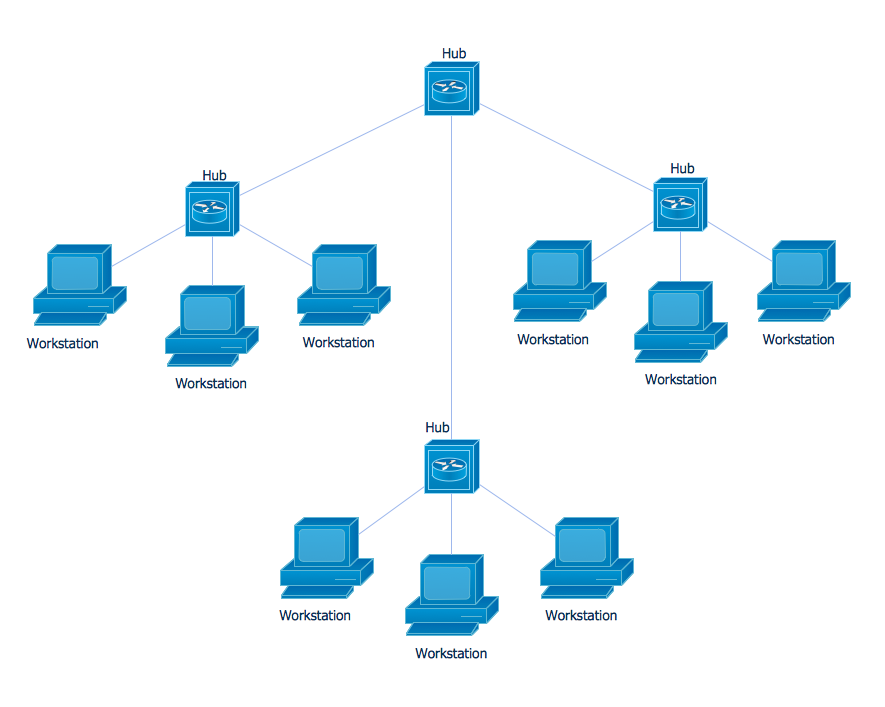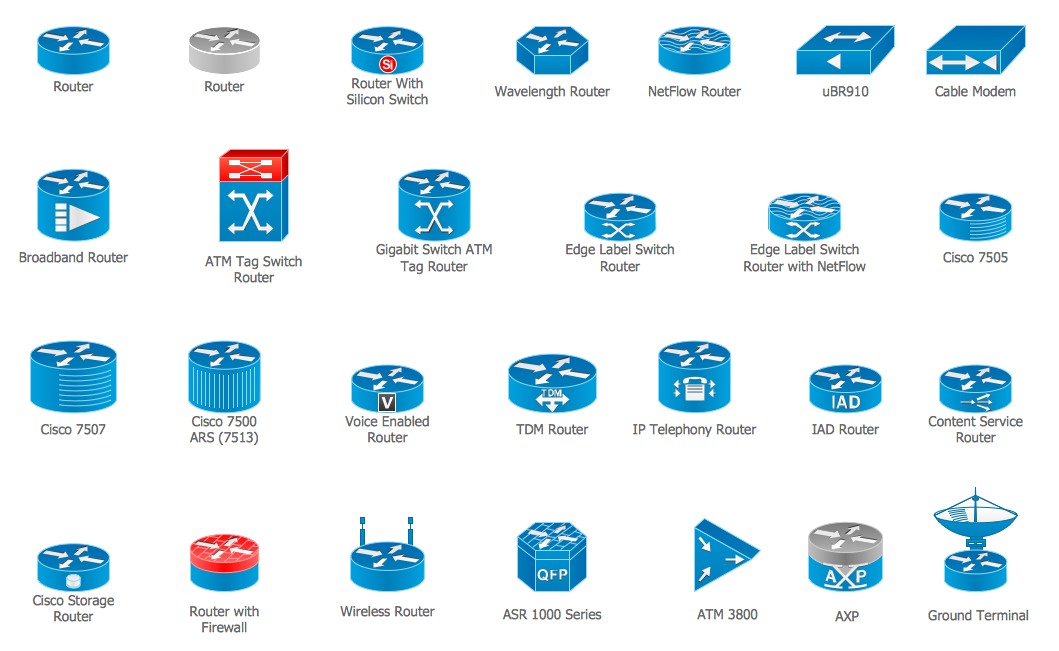Local area network (LAN). Computer and Network Examples
Local Area Network (LAN) is a network which consists of computers and peripheral devices connected each other and to the local domain server, and covers a little territory or small number of buildings, such as home, school, laboratory, office, etc. LAN serves for few hundreds of users. It includes many cables and wires, and demands to design previously a Network diagram. All local area network devices can use the shared printers and disk storage. ConceptDraw DIAGRAM is a perfect network diagramming software with examples of LAN Diagrams, templates and predesigned vector objects. ConceptDraw DIAGRAM is the ideal choice for network engineers and network designers who need to draw fast and easy Local Area Network Diagrams, for IT specialists, developers and other IT professionals which need to visualize the communication schemes of LAN and visually document the LAN's physical structure and arrangement in houses, offices and other buildings. Ready-to-use vector objects from Computer Network Diagrams solution will help you design LAN diagrams in minutes.
Star Network Topology
Star is a basic computer network topology in which all nodes (computers and peripheral devices) of the network are connected to the central hub or switch with a point-to-point connection, forming a physical network segment. Such network segment can function separately or as a part of complex network topology. The switch is a server, the peripherals are the clients. The large workload and functions of network management are entrusted on the central computer, all information exchange goes through it, so it must to be obligatory the most powerful. The star network topology is a simple topology for design and implementation. Its advantages are high performance, flexible administration capabilities, simplicity of adding additional nodes and search of faults, the fact that a failure of one workstation doesn't affect the work of entire network. But the failure of central hub will result the failure of whole network or network segment - it's the main disadvantage. Use the ConceptDraw DIAGRAM with Computer and Networks solution to designing Star Network Topology Diagrams fast and easy.
Cisco Routers. Cisco icons, shapes, stencils and symbols
Network infrastructure planning is a very important process in the network construction, and the share of time allocated to this within the scope of the entire project may reach 60-80%. A competent and thorough approach to planning contributes to the quick investment return, and also increases the reliability and flexibility of the final system, reducing the probability of additional costs related to the incorrect implementation. Any planning begins with an analysis of the business requirements to the final system. Basic network parameters, which should be assessed are the scalability, accessibility, cost, speed and safety. Speed and cost are often mistaken for the most important parameters, and the rest of the parameters aren't even remembered. This is not entirely correct. Initially, it is necessary to assess the business plans for the future, because sometimes it is more profitable to invest more money in the beginning. If the business is to develop, then, consequently, demands on- List Out Twenty Laboratory Apparatus Their Uses And Diagram
- 20 Laboratory Apparatus Their Uses And Images
- List 20 Laboratory Apparatus
- List The Uses And Diagram Of Chemistry Laboratory Apparatus
- List Twenty Apparatus And Their Uses
- List 20 Laboratory Apparatus And Their Uses
- Design elements - Laboratory equipment | Physics Diagrams ...
- List And The Diagram Of Lab Apparatus
- Draw The Twenty Apparatus Used In The Laboratory
- Mechanical Engineering | Diagram Of 20 Chemistry Apparatus
- Draw Any Twenty Apparatus And Their Uses
- Draw The Twenty And Different The Types Of Apparatus And Their ...
- List Any 20 Circuit Apparatus And Their Symbols
- Mechanical Engineering | Draw 20 Apparatus In Physics
- Mention 20 Laboratory Apparatus Their Uses And Their Diagram
- 20 Laboratory Apparatus And Uses
- Electrical Symbols, Electrical Diagram Symbols | List 20 Apparatus ...
- List Of Laboratory Apparatus And Their Uses With Pictures
- Any Twenty Laboratory Apparatus And Their Uses
- List Of Physics Laboratory Apparatus And Their Uses


